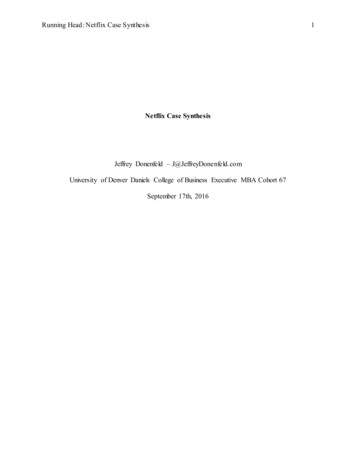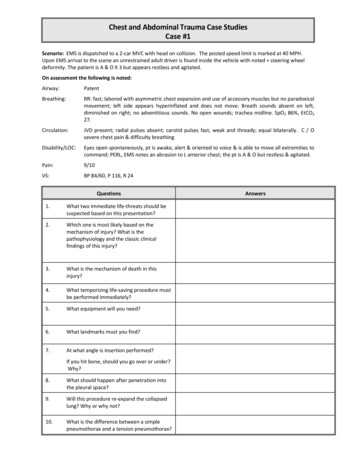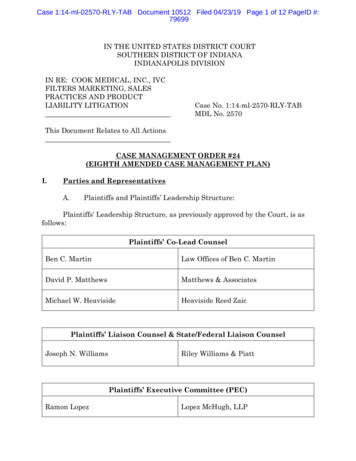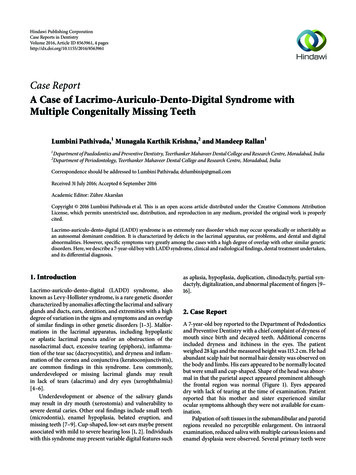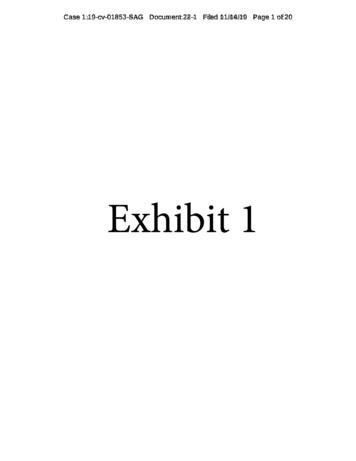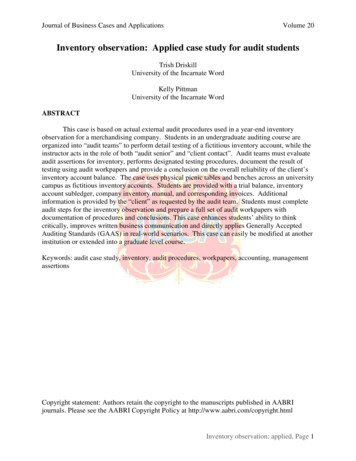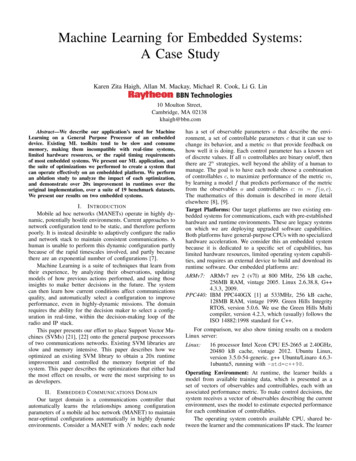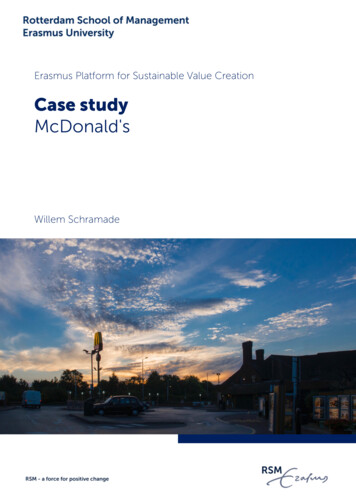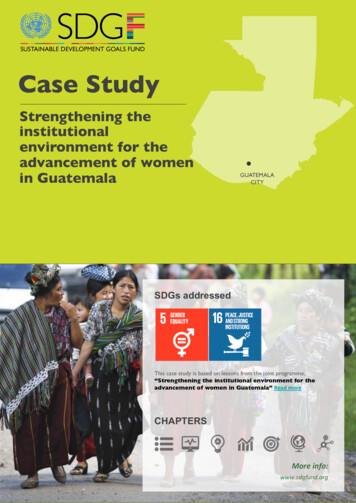
Transcription
Case StudyStrengthening theinstitutionalenvironment for theadvancement of womenin GuatemalaGUATEMALACITYSDGs addressedThis case study is based on lessons from the joint programme,“Strengthening the institutional environment for theadvancement of women in Guatemala” ReadmoreCHAPTERSMoreinfo:www.sdgfund.org
PARTICIPATING UN AGENCIES:
1. SUMMARYThe intervention centred on the strengthening ofthe Office for the Defence of Indigenous Women(DEMI) and the Presidential Secretariat for Women(SEPREM), with the objective of bringing genderpolicies and services to the attention of women –particularly indigenous women – in Guatemala.This case study analyses the experiences, lessonslearned, results and challenges of the programmedeveloped in Guatemala. The objective is toreinforce and broaden the available knowledge inworking for the empowerment of women bystrengthening the institutions that safeguard theirrights.In order to do this, the programme was based onthe National Policy for the Promotion and IntegralD e v e l o p m e n t o f Wo m e n a n d i t s E q u a lOpportunities Plan (PNPDIM-PEO 2008-2023). Theactivities took place in the departments ofC h i q u i m u l a , A l t a Ve r a p a z , To t o n i c a p á n ,Huehuetenango, San Marcos, EL Quiché and Sololá,and they revolved around the following foundations:Strengthening the abilities of technical andadministrative personnel by providing training andaccountability processes and dialogue betweenthese institutions and women.Fighting against gender discrimination and violence.Educating school groups about the elimination ofgender stereotypes and themes of violence.Sustainable Development Goals FundThe poverty in Guatemala continues to be largely feminine, ruraland indigenousCase Studies - Guatemala - 1
2. THE SITUATIONGuatemala has various tools for the protection ofwomen’s rights and women’s social, economic,cultural and political advancement. Among them: theConvention on the Elimination of all types ofDiscrimination against Women; the Inter-AmericanConvention on the Prevention, Punishment andEradication of Violence against Women; and theAmerican Convention on Human Rights. Of course,there is still a lack of awareness about the nationaland international legal frameworks in placeregarding women’s rights in the country, as well asimportant budget and institutional shortages intheir application.In this way, the poverty in Guatemala continues tobe, above all, feminine, rural and indigenous. In 2006,of the total population considered to beeconomically active, only 38.3 per cent werewomen. In the political climate, women – especiallyindigenous women – come up against greaterbarriers to access the full scope of their humanrights. In the period 2004-2008, only 8.9 per cent ofthe deputations to Congress and 2.7 per cent ofthe council positions were occupied by women, ofwhich only 25 per cent were indigenous women.The root of the developmental problems and issuessurrounding the empowerment of women inGuatemala is founded in two interlinked structuralquestions. The first element, the discrimination thatGuatemalans suffer, principally corresponds tohistorical, social and cultural values that still prevailin the populations’ value system. As such, a largenumber of social and institutional practices maintaingender inequality. The second aspect has to do withthe country accepting the emerging process ofdemocratic institutionalization. The Stateinstitutions – especially the gender mechanismssuch as SEPREM and DEMO – are showing someinstitutional disruption, internally as well as in theirinter-institutional work with ministries and otherGovernmental requests.Additionally, another element to consider is thelimited budget that the Government has set asidefor SEPREM and DEMI in relation to the extensivemandate that they have undertaken. Theseinstitutions have historically had a limited capacityto apply and supervise the existing gender policies,with the added limitation of their scant presence ona departmental scale.Lack of awareness about thenational and internationallegal frameworks in placeregarding’s women’s rights inthe countrySustainable Development Goals FundDiscrimination thatGuatemalans suffer,principally corresponds tohistorical, social and culturalvaluesThe goverment has setaside relatively limitedbudgets for SEPREM andDEMI given their extensivemandatesCase Studies - Guatemala - 2
3. STRATEGYThe programme identified the need to strengthenSEPREM and DEMI so that they could bettersupervise the application of gender policies andtheir effects, largely at a local level. It also sought todevelop proposals and processes of social auditing.The implementation reached a wide geographicalarea. It was carried out in seven departmentsselected for their demographic characteristics andlevels of development: Chiquimula, Alta Verapaz,Totonicapán, Huehuetenango, San Marcos, ELQuiché and Sololá. The intervention centred on thefollowing foundations: Institutional strengthening of SEPREM and DEMI.Improving their capacity to respond by improvingthe techniques, management and policies of thetechnical and administrative staff. Promotingaccountability processes and dialogue betweenthese institutions and women, by followingadvances in the quality of demands put forwardby women. Institutionalization of the National Policy for thePromotion and Integral Development of Women2008-23 (PNPDIM), the Equal Opportunities Plan(PEO) and the Articulated Agenda on IndigenousWomen in SEPREM and DEMI through theestablishment of strategic alliances with thePresidential Secretariat of Planning andProgramming (SEGEPLAN), and some lineministries, in particular those of Economy, PublicFinance, Public Health, Welfare and Agriculture,and the National Institute of Statistics. Preparation of a report on the situation ofwomen and training to eradicate violence anddiscrimination, improving their economicempowerment and social and politicalparticipation.Institutional strengthening of SEPREM and DEMIInstitutionalization of the NationalPolicy for the Promotion and IntegralDevelopment of Women 2008-23Sustainable Development Goals FundPreparation of a report onthe situation of women andtraining to eradicate violenceand discrimination, improvingtheir economicempowerment and social andpolitical participationCase Studies - Guatemala - 3
4. RESULTS AND IMPACTThe programme contributed to strengtheningbodies such as SEPREN and DEMI, which becamepublic institutions, meaning that their profile withinsociety notably improved. SEPREM’s abilities as agoverning body, assessor and coordinator of prowomen public policy were strengthened, and DEMI,in its role as a body for defending the rights ofindigenous women at a legislative level, through thepromotion and strengthening of the Women’sC o m m i s s i o n o f t h e N a t i o n a l C o n g re s s .Furthermore, the following was achieved:Institutional Strengthening On a national level, the programme improved thetechnical and management abilities of technicaland administrative personnel from 15 stateinstitutions. The work with participatingdepartments allowed female leaders from thelocal area to be identified and located, by givingthem support and awareness about advocacy andpolitical negotiation. DEMI opened seven departmental offices whichwork for 39 municipalities (which constitutes 68per cent of the indigenous and ruralpopulations), offering prevention, judicial, andpsychosocial support (group and individualtherapy) to survivors of gender violence. Thesedepartmental branches, along with those ofSEPREM supported by the programme,influenced the planning process and developmentof budgets, by focusing them on women’s rights. DEMI was enabled to provide services forwomen who were victims of violence,discrimination and racism on national and localscales. With this support, a total of 9,265 caseswere addressed by DEMI across the country. Human resources destined for improving therecognition of women within institutions wereincreased, also on a departmental level. At least80 per cent of the staff contracted during theexecution of the programme were later includedin the SEPREM chart, thus guaranteeing thecontinuity of the processes initiated. On a local level, the programme improvedwomen’s participation in decision-makingprocesses, reinforcing and expanding thepresence of SEPREM and DEMI in various areas,as well as dialogue with local women’sorganizations, strengthening their representationin the system of urban and rural developmentadvice, and offering training in aspects ofgovernance and women’s rights.The political effect at a legislative level has alsobeen important. Through the strengthening of theWomen’s Commission of the National Congress,important legislative advances and regulations forthe inclusion of gender perspectives and policiesand actions in favour of women were achieved.The programmeimproved the techincaland managementabilities from 15municipalitiesDEMI and SEPREMDEMI provide services fordepartamental brancheswomen who were victimssupported by theof violence, discriminationprogramme influenced the and racism on national andplanning process andlocal scales, with a total ofdevelopment of budgets, by9,265 casesfocusing on women’s rightsSustainable Development Goals Fund80 per cent of the staffcontracted during theexecution of theprogramme were laterincluded in the SEPREMchartCase Studies - Guatemala - 4
Fight against gender-based violence anddiscriminationSEPREN and DEMI prepared a set of tools tostrengthen the abilities of their new staff. Theystandardized good practices and lessons learned,not only related to the programme’s activities, butalso those related to the execution of relevantlegislation. In addition, the programme used 5 percent of the departmental development advicebudget to put training projects into placespecifically for women.Community awareness in the local environmentwas crucial for educating people about complaintprocedures and the characteristics of violenceagainst women. After the intervention, women,children and teenagers – especially from indigenousand rural backgrounds – had better access toservices to prevent and respond to violence.Furthermore, they recognized some of theachievements: The creation of the Autonomous Institute forthe Political Education of Indigenous Women.They ran intensive courses in political policyeducation and delivered tools for thedevelopment of political campaign strategies andcommunication to 60 potential candidates forpopular election posts. The Ministry of Public Education was supportedto incorporate gender and ethnicity-relatedtopics into the National Curriculum and intoeducational and training materials from2009-2011. Seven school groups – 11,514 girls, boys andteenagers – which came from affected areas,received training on the elimination of genderstereotypes and violence.Creation of theAutonomous Institute forthe Political Education ofIndigenous WomenSustainable Development Goals FundThe Ministry of PublicEducation was supported toincorporate gender andethnicity-related topics intothe National CurriculumSeven school groupsreceived training on theelimination of genderstereotypes and violenceCase Studies - Guatemala - 5
5. CHALLENGES Discrimination because of gender continues tobe very present in Guatemala and its institutions.One of the problems that persists is the fact thateach institution has its own purpose, vision andtargets, and these do not necessarily give rise tothe recognition of the historical exclusion ofwomen, and indeed many were legitimized andnaturalized. This proved to be a barrier toincreasing women’s participation in theprogramme’s activities and decision-making. Forfuture similar interventions, workshops shouldbe organized with the women and men from thecommunities, in order to confront theseattitudes and help to break preconceived socialconventions. The construction and democratization of a State,post-conflict, has the potential to significantlystrengthen the rights and participation of womenin decision-making. In these countries, women’sbiggest worries about domestic and personalissues (such as family rights, inheritance or accessto land) are delegated to institutions which aretraditionally discriminatory, or to people who arenot from the government. All of these factorsimply that women come up against specificbarriers to reclaiming their rights and acting asfull-fledged citizens. The majority of the records concerning cases ofviolence that have been dealt with are notupdated and lack sufficient information regardingethnic origin, age and municipal district. The term‘community’ is usually used as though itrepresents a homogenous, clearly definedstructure. Of course, it is therefore essential toget closer to these communities bearing theircomplexities in mind, and not drawing onincorrect assumptions. Using this information isvital to form a support system appropriate forreality and which responds to the victims’ needs.Sustainable Development Goals FundFor future interventions, reinforcing or creatingautomatic registration systems is recommended. The rotation of personnel in medium- or longduration initiatives – those longer than two years– creates information gaps and long periods ofadaptation, which can only be corrected withpermanent information strategies and themaintenance of an active institutional memory.Mechanisms need to be designed that ensurecontinuity to the process, learning and theorganization’s institutional memory.Community awareness was crucial for educating peopleabout complaint procedures on violence against womenCase Studies - Guatemala - 6
6. LESSONS LEARNED The programme is a successful reference of theabilities and the impact of the United Nationswhen its agencies work in a coordinated andmultidimensional manner. Each one brought itsown knowledge and experience. Of course, inorder for the intervention to be successful, it isvery important that clear roles are assigned andagreements established about communalobjectives, followed by mutual learning by theconnected agencies and institutes. When dealing with topics as complex as genderbased violence, it is very important toaccompany activities with the creation of spacesfor training and dialogue, in order to strengtheninstitutions. These activities not only lead to abetter understanding of the magnitude of theproblem and how to cover it, but also help toconsolidate the institutions, by contributing tothe sustainability of the inter vention.Strengthening institutions in matters of genderand training society to initiate conversationsregarding it are two things that belong together.In this way, if the institutions are coming apartfrom women’s organizations, then putting theinstitutions and the civil society into contact witheach other may be beneficial to improve thequality of the applications. In order to address the subject of violenceagainst women it is vital to rely on the cases’registration procedures. It is important toorganize exercises and local workshops withgroups concentrated in the geographical areaswith the largest percentages of gender-basedviolence and this, along with public policy, willwork towards its eradication.Sustainable Development Goals FundIt is very important thatclear roles are assigned andagreements establishedabout communal objectivesIt is very important toaccompany activities withthe creation of spaces fortraining and dialogueIt is important to organizeexercises and localworkshops with groupsconcentrated in thegeographical areas with thelargest percentages ofgender-based violenceCase Studies - Guatemala - 7
7. SUSTAINABILITY AND POTENTIALFOR REPLICATIONunderstand the role that society as a whole can andshould play to reduce or eliminate gender andethnic inequality at economic, social, political andenvironmental levels. In order to facilitate socialparticipation in a country as culturally diverse asGuatemala, it is necessary that space for discussionbetween civil society and community, municipal andnational authorities exists. This is how genderpolicies can continue to be present in the publicagenda.A complete approach to gender equality ineconomic, political and social matters wasconsidered indispensable, strengthened by thedirect involvement of development advice, such asthat for the organization and/or strengthening ofThe practices in place for the strengthening of the women’s municipal commissions led by SEPREMinstitutions regarding women’s empowerment canand DEMI. In the climate of economicprovide a reference for the other similar ongoing empowerment, SEPREM implements nationalprojects in Guatemala, and also for other countries.economic policies to promote women’s access toIn order to guarantee sustainability of the actions, credit and works directly with the Ministry ofevents must be promoted for sharing the challenges Finance to strengthen the creation of economicfaced and the lessons learned, which will facilitate policies.the retraining of institutional technical staff, but willalso ensure that the issue of gender inequality isknown by the population. It is necessary toA complete approach to gender equality in economic, politicaland social matters is indispensableTranslated by Lucy OyeladeSustainable Development Goals Fund SDG Fund 2017Case Studies - Guatemala - 8
indigenous women – come up against greater barriers to access the full scope of their human rights. In the period 2004-2008, only 8.9 per cent of the deputations to Congress and 2.7 per cent of the council positions were occupied by women, of which only 25 per cent were indigenous women.!
